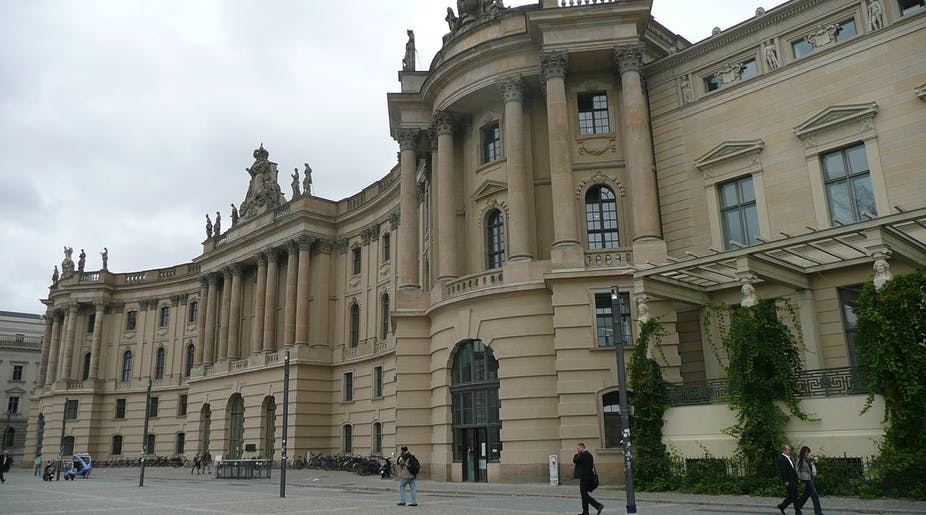In September 2017 Emmanuel Macron revived the idea of the European university during his Sorbonne speech on the future of Europe. Twenty of such European universities should emerge until 2024. Composed of four to six higher education institutions in at least three EU member states, European universities should develop joint-degree and executive-education programs, as well as ambitious research and innovation projects. An integrated and coordinated curriculum across several countries taught in different languages should enable and encourage students to move between participating universities instead of staying at one institution.
Several institutions and initiatives can be seen as predecessors of the European university, such as the 4EU Alliance, the EuroTech Alliance, ESCP Europe, the Franco-German University, and obviously the Erasmus+ program. The first official call for applications for the European university is planned to take place this fall. There are at least four pitfalls to avoid in order for the European university to best fulfil its intended purpose: to educate future Europeans, dedicated to European values, and able to work across national borders and cultures within and beyond the European Union.
Identity
EU higher education needs a European identity. Currently diplomas are only national. A European university graduate could thus obtain a French, German, or Italian diploma (or several of those in the case of double or triple degrees) but s/he will not be able to receive a European one. Symbolically, this is a hard sell – especially for students coming from outside Europe: a Chinese proudly studying at a European university would return with a national diploma from, say, the Netherlands.
Not being able to deliver a European diploma is hindering the development of a European identity and a sense of European-ness among its citizens, an identified aim of the European Commission: “Education and culture are the key to the future” (Jean-Claude Juncker). To create a European degree, some seemingly simple yet in reality highly complex questions need to be answered: Who will deliver such a diploma? Who decides upon its requirements? Who will accredit that these requirements have been met?
Diversity
To gain cultural intelligence, one necessarily needs to be exposed to cultural diversity. This is often easier said than done, because the teaching language can cause some serious headache. English might allow for a cultural mix in the lecture hall if the English level of all students and professors were sufficient. To achieve this, some more intensive language training during secondary education would be needed in several EU countries. The question becomes even more complex if one wants to reach trilingualism. Aware of this issue, the Commission demands that any European should finish secondary education with a “good knowledge” of at least two foreign languages.
Next to this cultural element, a second type of diversity needs to be considered at a European university: social diversity. Moving from one country to another and living in different cities within the scope of one’s studies is not cheap and there is a danger that only wealthier students could afford to do so. This obviously would be contradictive to European values and therefore solutions need to be found. Here, questions of scholarships, student jobs and loans will need to be addressed.
Essence
It goes without writing that a European university should teach European specificities in most academic areas. At ESCP Europe Business School, for example, where all students move across Europe during their program, a European approach to management is taught defined as “a cross-cultural, societal management approach based on interdisciplinary principles”. Of course, this is easier in some areas than in others such as mathematics. But also here some common requirements could be found: For example, Peter-André Alt, president of the German Rectors’ Conference suggests that texts from thinkers such as Locke, Marx and Rousseau should be mandatory readings at any European university.
Additionally, one could imagine that all students at a European university need to attend a course on European institutions and their functioning. In this line of thinking, the European Commission even suggests that specific attention (and budget) should be paid to higher-education institutions that “deliver education on European issues”. Examples here are the European University Institute in Florence, the College of Europe in Bruges, or the European Institute of Public Administration in Maastricht.
Attractiveness
Finally, European universities should be attractive for the brightest students. European politics might make this complicated. Well-known brands such as the Humboldt-Universität zu Berlin or Sorbonne Université should participate. Kurt Deketelaere, Secretary-General of the League of European Research Universities, states that European universities should showcase the “excellence” in many universities across Europe and continues: “I hope […] not going to end up with mediocre institutions” forming a cluster as they have the right geographical location and tick the right political boxes.
With respect to participating countries, the plan is to only have the Erasmus+ countries be eligible. Thus countries like the post-Brexit United Kingdom and Switzerland might fall short – a pity when thinking of brands like Oxbridge or ETH Zurich. Also, some countries’ languages might be more attractive and easier accessible than others. Obviously no country within the EU should be hindered to participate. Still, when choosing candidates, pragmatism should rule over pure EU technocracy. For example, smaller countries could participate in clusters with universities from two larger ones, and this, notably in domains they dispose of particular expertise: Estonia, Europe’s digitalisation expert, could thus lead a European university in the area of digital transformation.
An IDEA worth thinking about
It is vital that the objective of the European university be clear. Some voices talk about the need to develop excellence clusters to be part of international university rankings, such as Shanghai. Others see a potential to help less-developed regions across Europe or to reduce inequalities between the North/South and West/East of Europe. However, successful initiatives usually have one primary focus. And if the European university is supposed to generate truly European, multilingual and culturally intelligent citizens open to the world, it will be necessary to put this purpose over politics and technocracy and follow the aforementioned IDEA: Identity – Diversity – Essence – Attractiveness.



 Nighttime Shelling Causes Serious Damage in Russia’s Belgorod Region Near Ukraine Border
Nighttime Shelling Causes Serious Damage in Russia’s Belgorod Region Near Ukraine Border  Trump Says “Very Good Talks” Underway on Russia-Ukraine War as Peace Efforts Continue
Trump Says “Very Good Talks” Underway on Russia-Ukraine War as Peace Efforts Continue  Trump Allows Commercial Fishing in Protected New England Waters
Trump Allows Commercial Fishing in Protected New England Waters  Missouri Judge Dismisses Lawsuit Challenging Starbucks’ Diversity and Inclusion Policies
Missouri Judge Dismisses Lawsuit Challenging Starbucks’ Diversity and Inclusion Policies  Elon Musk’s Empire: SpaceX, Tesla, and xAI Merger Talks Spark Investor Debate
Elon Musk’s Empire: SpaceX, Tesla, and xAI Merger Talks Spark Investor Debate  TrumpRx.gov Highlights GLP-1 Drug Discounts but Offers Limited Savings for Most Americans
TrumpRx.gov Highlights GLP-1 Drug Discounts but Offers Limited Savings for Most Americans  Trump Endorses Japan’s Sanae Takaichi Ahead of Crucial Election Amid Market and China Tensions
Trump Endorses Japan’s Sanae Takaichi Ahead of Crucial Election Amid Market and China Tensions  BTC Flat at $89,300 Despite $1.02B ETF Exodus — Buy the Dip Toward $107K?
BTC Flat at $89,300 Despite $1.02B ETF Exodus — Buy the Dip Toward $107K?  China Warns US Arms Sales to Taiwan Could Disrupt Trump’s Planned Visit
China Warns US Arms Sales to Taiwan Could Disrupt Trump’s Planned Visit 
































